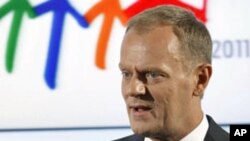Poland assumed the six-month rotating presidency of the European Union on July 1. Poles are largely pro-Europe, and hope to make the Union both more open and more closely integrated.
An enthusiastic Poland took the helm of the European Union on July 1, taking over the rotating six-month presidency from Hungary. This is the first time Poland has been president since it acceded to the EU in 2004. It is the fourth formerly communist country to hold the position.
Poland is Europe’s sixth largest economy, and the only EU country to avoid a recession during the recent financial crisis. It has also been the single largest beneficiary of EU funds. During a speech on Friday, Polish Prime Minister Donald Tusk emphasized that Poland should be considered a European success story.
He said that for many Europeans, Poland is a symbol of hope, optimism, energy and strength in times of crisis. He added that Europe has invested a lot in Poland over the past 20 years, and Poland will invest its energy in Europe.
One of the top priorities for the Polish EU presidency is expected to be deeper economic integration, and strengthening Europe’s single market. But as Adam Balcer of the Warsaw-based consulting firm Demos Europa explains, Poland is also looking to further European expansion, particularly in the Western Balkans. Bringing Croatia, Serbia and Montenegro closer to the EU is, he says, very much in Poland’s interests.
“There’s an idea that stability in this neighborhood will bring more active engagement on the EU’s side in the eastern neighborhood, which is of crucial significance for us. Also there is an increasing awareness in Poland that after the accession of the Western Balkan countries to the EU, the countries will most probably become our natural allies in some coalitions,” Balcer explained.
The EU presidency was warmly welcomed in Warsaw on Friday, where some 10,000 people gathered for a day full of concerts and cultural events. Balcer explains that in general, Poles are very pro-Europe, and that in recent years they have begun to feel more of a sense of ownership of the Union and the decisions made within it.
“I would say that in Poland there is Euro-optimism. We have a very positive attitude to the EU, because the last few years certainly was a great success story of our country, and to some extent the EU contributed. There is widespread perception that we belong to the EU, that we are members of this organization and we are important stakeholders. Certainly this self-perception significantly increased in recent years,” Balcer said.
However, not everyone in Poland is convinced by the government’s attempts to generate enthusiasm. In 2009, the structure of EU governance was changed by the Lisbon Treaty, which diminished the power of the presidency. Many feel that the position is now largely symbolic.
One woman says she does not think Poland will be able to make much of a difference over the next six months. “The real issue here is how much legislative powers this presidency may have in the European Union, and the answer to it is not really. It is purely a decoration. I don’t think it is going to have any great impact,” she stated.
But Balcer explains that even if Poland is unable to make any real changes to European policy, it will at least have the chance to try its hand at dealing with places like China and North Africa. The very act of engaging with the wider world, he says, could draw Poland’s attention away from the East, and give the country a more global perspective.
“This presidency can be a chance for Poland to realize that a country which aspires to be one of the main players in the EU can’t have parochial foreign policy. We should be much more active in the global scene. You can’t be focused only on one region. It’s a chance for Poland to be in the mainstream of the EU, and to be engaged in global affairs,” Balcer noted.
With the sovereign debt crisis, turmoil in North Africa and a new EU budget under discussion, the European Union certainly has its work cut out for it over the next six months. The challenges ahead are enough to test anyone’s Euro-optimism, even Poland’s.
Poland’s EU Presidency to Focus on Integration and Expansion











